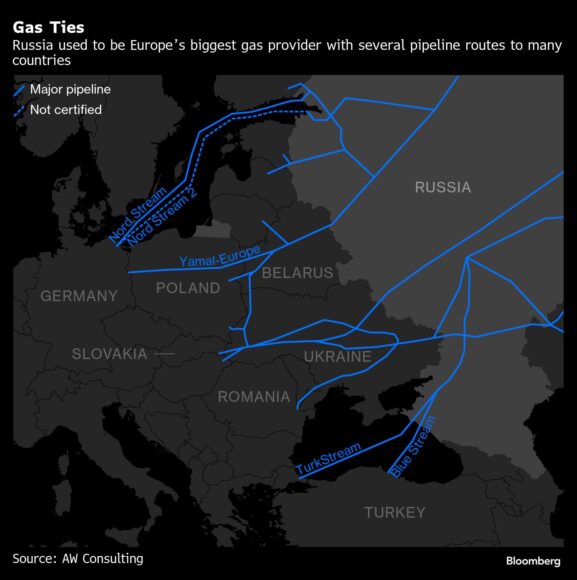The European Union proposed a ban on the Nord Stream gas pipelines and the reduction of an oil price cap as part of a new sanctions package that aims to pile pressure on Moscow to end its war against Ukraine.
“Russia’s goal is not peace — it’s to impose the rule of might,” European Commission President Ursula von der Leyen told reporters in Brussels Tuesday. “Therefore we are ramping up pressure on Russia because strength is the only language that Russia will understand.”
The 27-member bloc is stepping up measures aimed at Russia in the fourth year of its war in Ukraine as US President Donald Trump backs off demands for an unconditional ceasefire. The new package, which is subject to change, may be adopted when EU foreign ministers next meet on June 23. It requires the unanimous backing of all 27 member states.
The measures were reported last month by Bloomberg News.
The ban on Nord Stream, the Baltic Sea gas-transit channel directly linking Russia to Germany — though inoperable since the first year of Russia’s war — will entail prohibiting operators from from making transactions involving Nord Stream. German Chancellor Friedrich Merz has also backed the measure.
“There’s no return to the past,” von der Leyen said.
Lowering a Group of Seven-sponsored oil-price cap to $45 will require backing from the US. The price threshold, which bans G-7 service providers from transporting and dealing with crude sold above the cap, is currently set at $60. G-7 leaders will discuss the issue when they meet in Canada later this month, von der Leyen said.
“By lowering the cap, we adapt to changed market conditions and restore its effectiveness,” von der Leyen told reporters, expressing confidence that the G-7 would agree to “do it together.”
The EU’s move follows diverging positions on Russia between the White House and Brussels. The US president suggested last week that he may look on as Russia and Ukraine continue to wage war, even as US lawmakers weigh plans to force a ceasefire with sanctions supported by a broad bipartisan majority. Despite the votes, supporters show little sign they’re ready to challenge Trump.
Merz, who visited Trump in the White House last week, said sanctions had been a “heavy” blow to the Russian economy — and encouraged the US administration to move.
“The question of how long Russia can endure this war also depends on the effectiveness of the sanctions,” the German leader said in Berlin alongside his Dutch counterpart, Dick Schoof. “That is why we, and I personally, are advocating for America to impose sanctions now.”

The Nord Stream ban aims to put an end to persistent speculation about reviving flows. Even without a formal ban, activating Nord Stream 2, which was completed but never certified by the German government, was unlikely to happen. A September 2022 bomb explosion that partially damaged the pipelines brought a complete halt to transits.
The bloc is also proposing cutting 22 banks from SWIFT, the international payments system, and imposing some €2.5 billion ($2.9 billion) worth of fresh trade restrictions as it seeks to further curtail Russia’s revenue and ability to secure technology for weapons.
Additionally, the EU wants to list an additional 77 vessels that make up part of Russia’s so-called shadow fleet used to transport sanctioned products — and introduce a ban on the import of refined products based on Russian crude oil.
EU firms are involved in an array of service provision for Russia that’s legal under the cap at current prices but wouldn’t be at $45. That includes use of the large Greek oil-tanker fleet, as well as insurance and reinsurance that’s provided by different firms across the continent.
Was this article valuable?
Here are more articles you may enjoy.


 Fla. Commissioner Offers Major Changes to Citizens’ Commercial Clearinghouse Plan
Fla. Commissioner Offers Major Changes to Citizens’ Commercial Clearinghouse Plan  Former Broker, Co-Defendant Sentenced to 20 Years in Fraudulent ACA Sign-Ups
Former Broker, Co-Defendant Sentenced to 20 Years in Fraudulent ACA Sign-Ups  Florida Engineers: Winds Under 110 mph Simply Do Not Damage Concrete Tiles
Florida Engineers: Winds Under 110 mph Simply Do Not Damage Concrete Tiles  Preparing for an AI Native Future
Preparing for an AI Native Future 

